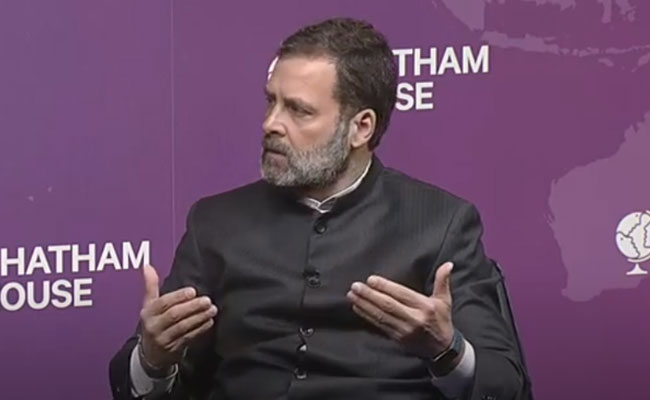London (PTI): The BJP likes to believe that it will be in power in India "eternally" but that is not the case and the Opposition can come together to undertake the "repair work" that needs to be done for Indian democracy, Congress leader Rahul Gandhi has said.
Addressing an in-conversation session at the Chatham House think tank in London on Monday evening to round off his week-long UK tour, the MP from Kerala's Wayanad once again claimed that Israeli software Pegasus was planted on his phone as he accused the ruling Bharatiya Janata Party (BJP) of trying to silence dissent in India.
"To put it in perspective, if you look at the time from independence to now, the Congress party has been in power for the majority of the time," Gandhi said.
"Before the BJP was in power for 10 years, we were in power for 10 years. The BJP likes to believe that they have come to power in India and they are going to be in power eternally, that's not the case," the 52-year-old former Congress chief said.
The BJP-led National Democratic Alliance (NDA) government came to power in India in 2014.
Gandhi pointed to a set of changes taking place in India that had caught the Congress and the previous United Progressive Alliance (UPA) government led by the party off guard, such as a shift from rural to urban.
"We were focusing a lot on the rural space and we missed the ball at the beginning on the urban space, that is a fact. Those things are there. But to say that the BJP is in power and the Congress gone, that is actually a ridiculous idea," he said.
During his Chatham House discussion, Gandhi pointed out that besides the Congress, the foreign media has also been highlighting that there is a "serious problem with Indian democracy".
"It is also the way the BJP responds. It is not interested in a conversation. They have decided that they know what is going on, nobody else in the country knows what is going on and that is it.... My phone had Pegasus on it, that simply was not happening when we were in power. So there are things that are very obvious and apparent to everyone," he said.
The BJP has accused Gandhi of maligning India on foreign soil, with Union Information and Broadcasting Minister Anurag Thakur hitting out at his remarks in London and asking the Congress leader not to betray the nation.
"Do not betray India, Rahul Gandhi ji. The objections to India's foreign policy are evidence of your scant understanding of the issue. No one will believe the lies you spread about India from foreign soil," Thakur told reporters in New Delhi on Monday.
The BJP has also made light of Gandhi's allegation that he was being snooped upon, saying that the Congress leader was "hallucinating" and makes such claims as he wants to create headlines wherever he goes.
In his address at the Chatham House, Gandhi also took aim at the Rashtriya Swayamsevak Sangh (RSS) as a "fundamentalist, fascist organisation" that has changed the nature of the democratic contest in India by capturing the country's institutions.
Asked to explain the RSS to a foreign audience, he noted: "You can call it a secret society. It is built along the lines of the Muslim Brotherhood and the idea is to use the democratic contest to come to power and then subvert the democratic contest afterwards.
"It has shocked me at how successful they have been at capturing the different institutions of our country. The press, judiciary, Parliament, Election Commission -- all the institutions are under pressure, under threat and controlled in one way or another."
On India's foreign policy, Gandhi drew a comparison between the Russia-Ukraine conflict and India-China relations and accused China of sitting on 2,000 square kilometres of Indian territory, adding that "but our prime minister says they are not there".
"The basic principle applied in Ukraine by the Russians is that they do not accept the relationship the Ukrainians have with Europe and America, and have told Ukraine that if you do not change this relationship, we will challenge your territorial integrity. In my view, that is what is happening on the borders of my country," he claimed, adding that China is similarly threatening India over its relations with the United States.
"The basic idea behind the troops in Arunachal (Pradesh) and Ladakh is similar to what has happened in Ukraine, and I mentioned this to the foreign minister (S Jaishankar). He completely disagreed with me and he thinks it is a ludicrous idea," the Congress leader said.
Among the questions from a diaspora and academic audience at the event, Gandhi was asked about dynastic politics as an impediment to Indian democracy, which he dismissed as a factor and blamed "structural" issues "way beyond dynastic politics" as a threat.
On India-Pakistan relations, the Opposition leader said he believes it is important to have good relations with all neighbouring countries but added that it depends on the actions of the Pakistanis.
"If the Pakistanis are promoting terrorism in India, that becomes very difficult. And that does happen," he said.
Let the Truth be known. If you read VB and like VB, please be a VB Supporter and Help us deliver the Truth to one and all.
Thane (PTI): A wild fox was rescued on Sunday after it fell into an open water tank in Thane's Shil area, an official said.
The rescue operation, which started at noon, was a coordinated effort between the Fire Brigade, wildlife personnel that took one hour, Thane Municipal Corporation disaster management cell chief Yasin Tadvi said.
"The fox fell into a tank located near Muktai residency on Kalyan-Shilphata road. The rescue proved challenging due to the confined space of the tank. However, through the combined efforts of the fire brigade and forest officials, the fox was safely pulled out after nearly an hour of careful manoeuvring," Tadvi said.
ALSO READ: 9 killed, 10 wounded in South African pub shooting
Following the rescue, the animal was checked for injuries and taken by the forest department for further observation before its eventual release, he said.





